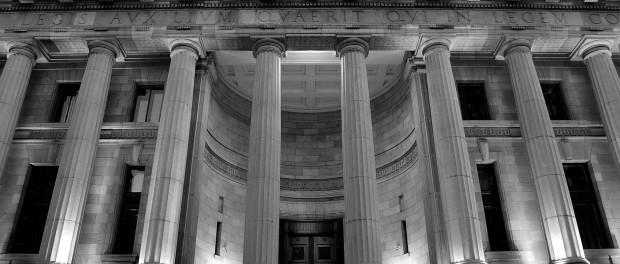No Appeals Without Laws & Other Quebec Curios
It’s convenient to have the Quebec Court of Appeal right across the street from the Palais de justice so as to run to appeal your court case straight away, although being caught crossing in the middle of a street could potentially be dangerous on numerous levels here. In addition, it is highly unlikely for the Court of Appeal to automatically hear a court case seconds after its judgement.
Originally composed of four judges, the Quebec Court of Appeal (the “Court of Queen’s Bench”) was created in 1849 to hear appeals from the then-Lower Canada courts. It gained its name as we know it today in 1974, 125 years after its creation. In its Montreal seat, the Court of Appeal has occupied Édifice Ernest-Cormier since 2004; it has occupied its Quebec location since the construction of the courthouse building in the 1980s. Its Montreal location, designed in part by Ernest Cormier, is designed in the Beaux Arts style (the neoclassical architectural style of Paris) and contains the Latin inscription “frustra legis auxilium quaerit qui in legem committit” (he who breaks the law searches for its help in vain) near the top of the building.
The Court of Appeal can only hear cases where an appeal has been allowed by legislation. No appeal permission from a legal text means no appeal, period. Judgements that can be appealed fall into two categories: it can be out of right (in which case the person does not have to ask permission to appeal) or if a judge of the Court of Appeal deems the litigation to be appeal-worthy. The Court of Appeal now usually has only three judges sitting at a time per issue, although if a case is very important, there can be up to five judges.
Previous Court of Appeal judges include Supreme Court justices Claire L’Heureux-Dubé, Antonio Lamer, Louis LeBel, Morris Fish, and Clément Gascon as well as Order of Canada recipient Jean-Louis Baudouin. The average wait time last year for a normal appeal for civil files was one year and for criminal files, a little more than half a year. According to the SOQUIJ database, as of January 1 of this calendar year, at the time of writing, there have been 867 decisions selected by the editors of the database for publication.






